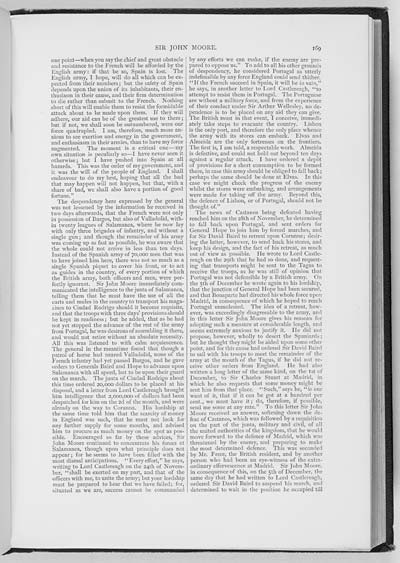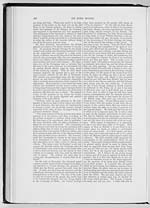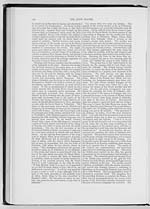169
one point�when you say the chief and great obstacle
and resistance to the French will be afforded by the
English army: if that be so, Spain is lost. The
English army, I hope, will do all which can be ex-
pected from their numbers; but the safety of Spain
depends upon the union of its inhabitants, their en-
thusiasm in their cause, and their firm determination
to die rather than submit to the French. Nothing
short of this will enable them to resist the formidable
attack about to be made upon them. If they will
adhere, our aid can be of the greatest use to them;
but if not, we shall soon be outnumbered, were our
force quadrupled. I am, therefore, much more an-
xious to see exertion and energy in the government,
and enthusiasm in their armies, than to have my force
augmented. The moment is a critical one�my
own situation is peculiarly so�I have never seen it
otherwise; but I have pushed into Spain at all
hazards. This was the order of my government, and
it was the will of the people of England. I shall
endeavour to do my best, hoping that all the bad
that may happen will not happen, but that, with a
share of bad, we shall also have a portion of good
fortune."
The despondency here expressed by the general
was not lessened by the information he received in
two days afterwards, that the French were not only
in possession of Burgos, but also of Valladolid, with-
in twenty leagues of Salamanca, where he now lay
with only three brigades of infantry, and without a
single gun; and though the remainder of his army
was coming up as fast as possible, he was aware that
the whole could not arrive in less than ten days.
Instead of the Spanish army of 70,000 men that was
to have joined him here, there was not so much as a
single Spanish piquet to cover his front, or to act
as guides in the country, of every portion of which
the British army, both officers and men, were per-
fectly ignorant. Sir John Moore immediately com-
municated the intelligence to the junta of Salamanca,
telling them that he must have the use of all the
carts and mules in the country to transport his maga-
zines to Ciudad Rodrigo should it become requisite,
and that the troops with three days' provisions should
be kept in readiness; but he added, that as he had
not yet stopped the advance of the rest of the army
from Portugal, he was desirous of assembling it there,
and would not retire without an absolute necessity.
All this was listened to with calm acquiescence.
The general in the meantime found that though a
patrol of horse had neared Valladolid, none of the
French infantry had yet passed Burgos, and he gave
orders to Generals Baird and Hope to advance upon
Salamanca with all speed, but to be upon their guard
on the march. The junta of Ciudad Rodrigo about
this time ordered 20,000 dollars to be placed at his
disposal, and a letter from Lord Castlereagh brought
him intelligence that 2,000,000 of dollars had been
despatched for him on the 2d of the month, and were
already on the way to Corunna. His lordship at
the same time told him that the scarcity of money
in England was such, that he must not look for
any further supply for some months, and advised
him to procure as much money on the spot as pos-
sible. Encouraged so far by these advices, Sir
John Moore continued to concentrate his forces at
Salamanca, though upon what principle does not
appear; for he seems to have been filled with the
most dismal anticipations. "Every effort," he says,
writing to Lord Castlereagh on the 24th of Novem-
ber, "shall be exerted on my part, and that of the
officers with me, to unite the army; but your lordship
must be prepared to hear that we have failed; for,
situated as we are, success cannot be commanded
by any efforts we can make, if the enemy are pre-
pared to oppose us." To add to all his other grounds
of despondency, he considered Portugal as utterly
indefensible by any force England could send thither.
"If the French succeed in Spain, it will be in vain,"
he says, in another letter to Lord Castlereagh, "to
attempt to resist them in Portugal. The Portuguese
are without a military force, and from the experience
of their conduct under Sir Arthur Wellesley, no de-
pendence is to be placed on any aid they can give.
he British must in that event, I conceive, immedi-
ately take steps to evacuate the country. Lisbon
is the only port, and therefore the only place whence
the army with its stores can embark. Elvas and
Almeida are the only fortresses on the frontiers.
The first is, I am told, a respectable work. Almeida
is defective, and could not hold out beyond ten days
against a regular attack. I have ordered a dep�t
of provisions for a short consumption to be formed
there, in case this army should be obliged to fall back;
perhaps the same should be done at Elvas. In this
case we might check the progress of the enemy
whilst the stores were embarking, and arrangements
were made for taking off the army. Beyond this,
the defence of Lisbon, or of Portugal, should not be
thought of."
The news of Castanos being defeated having
reached him on the 28th of November, he determined
to fall back upon Portugal, and sent orders for
General Hope to join him by forced marches, and
for Sir David Baird to retreat upon Corunna; desir-
ing the latter, however, to send back his stores, and
keep his design, and the fact of his retreat, as much
out of view as possible. He wrote to Lord Castle-
reagh on the 29th that he had so done, and request-
ing that transports might be sent to the Tagus to
receive the troops, as he was still of opinion that
Portugal was not defensible by a British army. On
the 5th of December he wrote again to his lordship,
that the junction of General Hope had been secured,
and that Bonaparte had directed his whole force upon
Madrid, in consequence of which he hoped to reach
Portugal unmolested. The idea of a retreat, how-
ever, was exceedingly disagreeable to the army, and
in this letter Sir John Moore gives his reasons for
adopting such a measure at considerable length, and
seems extremely anxious to justify it. He did not
propose, however, wholly to desert the Spaniards;
but he thought they might be aided upon some other
point, and for this cause had ordered Sir David Baird
to sail with his troops to meet the remainder of the
army at the mouth of the Tagus, if he did not re-
ceive other orders from England. He had also
written a long letter of the same kind, on the 1st of
December, to Sir Charles Stuart at Madrid, in
which he also requests that some money might be
sent him from that place. "Such," says he, "is our
want of it, that if it can be got at a hundred per
cent., we must have it; do, therefore, if possible,
send me some at any rate." To this letter Sir John
Moore received an answer, softening down the de-
feat of Castanos, which was followed by a requisition
on the part of the junta, military and civil, of all
the united authorities of the kingdom, that he would
move forward to the defence of Madrid, which was
threatened by the enemy, and preparing to make
the most determined defence. This was seconded
by Mr. Frere, the British resident, and by another
person who had been an eye-witness of the extra-
ordinary effervescence at Madrid. Sir John Moore,
in consequence of this, on the 5th of December, the
same day that he had written to Lord Castlereagh,
ordered Sir David Baird to suspend his march, and
determined to wait in the position he occupied till

![]() Universal Viewer |
Universal Viewer | ![]() Mirador |
Large image | Transcription
Mirador |
Large image | Transcription
![]()

